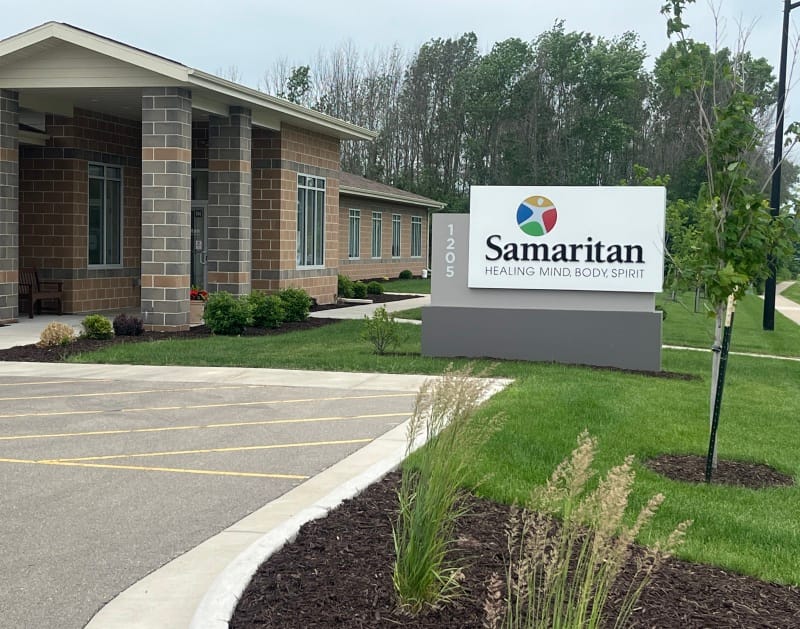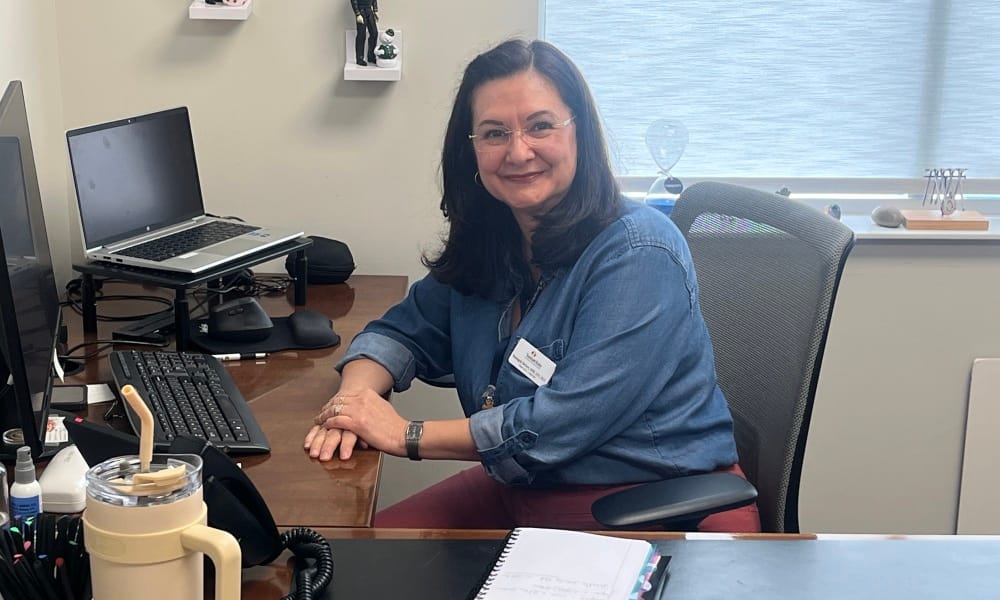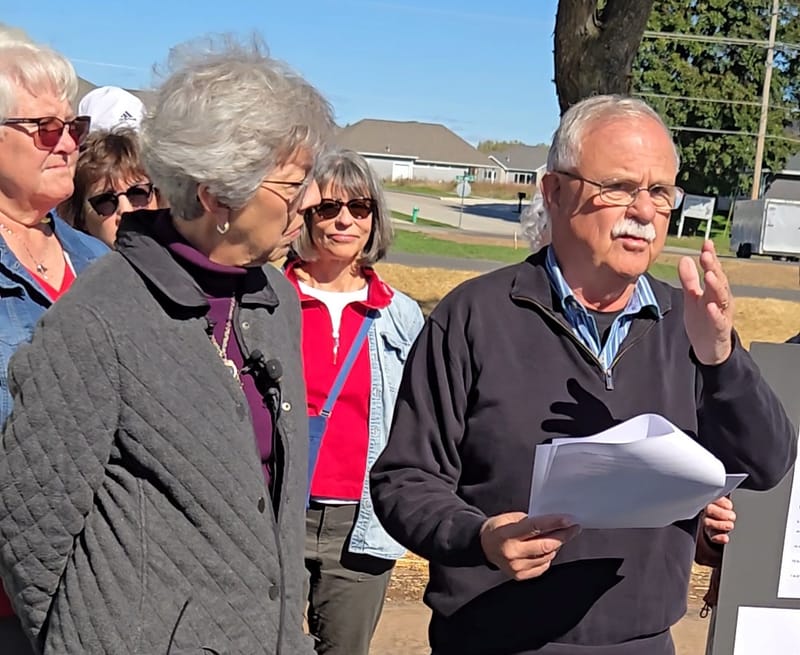During troubled era, Samaritan's Berbert finds energy, purpose
For a mental health professional living through these traumatic times it can be a blessing and a burden
- Rising demand for mental health services, especially among vulnerable populations (LGBTQ+, immigrants, women, minorities).
- Threats to mental health funding, particularly cuts to Medicaid and federal grants.
- Political climate adding stress and feelings of marginalization for many clients.
For underserved and vulnerable communities, especially, the need for mental health access has never been greater. At the same time the resources for those needs have never seemed more threatened, whether it be cuts to Medicaid that funds community mental health and the folks that utilize it or cuts to grants and research.
When you factor in the political climate that has immigrants, the LGBTQ+ community, women and minorities feeling under attack it can all feel a little overwhelming for those in the mental health profession.
For Rosangela Berbert, the answer lies in keeping her eyes right in front of her. Otherwise, she says, it might seem all too much.
“If you keep looking outside you can lose heart,” Berbert says. “There are just so many forces out there. And I find myself on my drive back home thinking, okay, what are the chances that this is going to change? So I’ll do what I can today.
“It’s like that illustration that may sound cheesy of the person walking on the seashore and tossing back one starfish into the ocean and someone says, ‘what difference are you making when it’s just one of thousands of them?’ But I’m making a difference for this one, right?”
Berbert is the executive director of Samaritan of Fox Valley, a non-profit, independently run mental health group that will celebrate its 55th anniversary later this year. Samaritan refers to its counselling as spiritually centered and was founded in Judeo-Christian roots when it launched in conjunction with First Congregational Church of Appleton in 1970.
Samaritan considers spirituality central to personal growth and to the resolution of emotional and psychological conflict. Its sign out front proclaims: Healing Mind, Body, Spirit. But, Berbert explains, while spirituality can include faith and religion, Samaritan is also committed to meeting people where they are, and not everyone is comfortable with traditional conceptions of religion and spirituality.
Part of Samaritan’s service is the integration of mental health with ministry. They offer training for members of the clergy in how to counsel members of their congregation when the demands grow beyond the pastoral and require more focused, psychology-directed intervention. She says Samaritan has been challenged before by members of the clergy to be even more Christian-focused in its approach.
“But when a person comes in with so much hurt that they can’t hear a sermon, when they can’t even see themselves stepping into a church for whatever reason, our duty is to keep them alive and hopeful,” she says. “And hopefully, they’re going to be open to that kind of outreach at some point.

“Therapy has to be treated as a sacred place because you’re touching the innermost parts of a person, their soul. And I really believe that what we do here is ministry. But you have to meet people where they are. You still find what is sacred to that person. And where do they find that core sense of purpose and strength and hope and bring that out? And it’s very precious to see when that happens.”
Berbert goes on to tell the story of a 17-year-old client who reached for a photo of his deceased grandfather when struggling emotionally and asking him for guidance and another suicidal patient for whom music was their sacred space.
“And so we would sit and listen to songs together and analyze them almost like if we were reading the Gospels together,” she says. “So spirituality, in the context of therapy, can take different shapes.”
At the same time, she insists, many clients come to Samaritan because of its religious connections. Still, because things have changed so much in the past half-century in terms of people’s concepts and understanding of religion and spirituality, Samaritan has adapted, changing the name from Fox Valley Pastoral Counseling Center in 2006.
‘There’s so much uncertainty’
Samaritan is state licensed and has been nationally accredited by the Solihten Institute since 1993. As a 501-c3 non-profit organization, Samaritan depends on health insurance, fees for outreach to ministry and schools, foundations, individual donations and grants. About a fourth of Samaritan’s funding comes from community support.
Nearly two-fifths of its clients pay via Medicaid, the program currently under threat by President Trump and the GOP, who seek to cut nearly $1 billion from the program. More than one million Wisconsinites are currently enrolled in Medicaid, or one in five. While no one is exactly sure just who might be impacted by such draconian cuts, it could certainly deliver a blow to Samaritan and other organizations that rely so much on it, not to mention the clients who need mental health access.
Any cut into Samaritan’s revenue stream could also impact other clients as well. Samaritan, for instance, offers sliding fee payments for folks at a certain income level.
And while Samaritan doesn’t apply for federal or state grants, the uncertainty around wholesale cuts to government grants elsewhere might ultimately impact Samaritan. The organization is currently awaiting word on a $250,000 grant that would be used to put in place a brand new program to conduct mental health screenings for adults in the workplace.
“There are articles out there that say the screening itself is not as effective,” Berbert says. “So we want to go that extra step. Currently, I'm not aware of anyone doing exactly that in the state. We will add some some questions that we have developed that have been deeply researched, and then that will indicate when there is a heightened risk for suicide.”
Berbert feels confident Samaritan will ultimately receive that grant, though there have been delays. And she worries in general about all the questions regarding future government funding.
“There's so much uncertainty, which is very hard on any business, and it has been particularly hard on nonprofits,” she says. “Everything is so volatile, and if that funding does not come through, we will continue to try to develop that program. But it's going to take longer because the resources are going to be much more limited.”
Samaritan has used similar screenings at area schools to assess the mental health of hundreds of students every year and to screen for potential suicidal ideation. If they deem it warranted, Samaritan reaches out to parents to help facilitate connections with providers for further evaluations.
‘It’s deeply meaningful’
“At the board meeting, we were just reporting on the number of kids that had to be hospitalized or facilitated hospitalization or connection with the provider on the same day,” Berbert says. “Because they were suicidal that day, that’s 150 students who were referred for treatment. Those could have been 150 funerals and so those treatments came about because of the screenings.”
Suicide figures to become an even greater risk as a result of recent government pronouncements and policies. Many, but by no means all, of those specifically target the gay and trans community. State Republican lawmakers scrapped 30 Gov. Evers-proposed programs in the upcoming budget dedicated to behavioral health care. President Trump revoked $11 billion in funding for addiction and mental health care. He has also issued executive orders limiting access to gender-affirming care for trans kids as well as prohibiting the use of preferred pronouns or references to gender identity and the elimination of the phone lifeline that provided specific suicide prevention support for LGBTQ+ kids.
Berbert seems especially flummoxed by that last action, given that it costs so little money.
“What I can say is that our wellness screenings clearly show that kids who identify as belonging to the LGBTQ-plus community have a heightened distress level,” she says. “I agree that a crisis line should be equipped to address any calls but there are groups out there that unless we call out and let them know we are here for you, they’re going to feel like they are isolated and ignored and are going to find closed doors. There are issues that are particular to certain groups that need to be paid attention to.
“We will see more people struggling and if the narrative around us is more laden with hate and prejudice we’re going to see some of the progress that we have made go backwards. What’s going to happen to people who are in the middle of gender-affirming treatment if that is forced to stop because hospitals can no longer provide that care?”
‘Yeah, that’s one life’
Berbert, who has lived in the Fox Valley for 23 years after moving from her native Brazil, also worries about immigrants in the area and the heightened stress levels in that community. She says it’s already heart-wrenching the issues immigrants bring to the counseling rooms even without the new fears of sudden deportation, things such as acculturation, family dynamics, adaptation, trauma.
For a mental health professional living through these traumatic times it can be a blessing and a burden, she says. Talking about the work she does – for this story, for example – energizes her, she says.
“It really brings to the forefront for me how important this is, how meaningful this is, like how many lives are impacted, from the people who work internally to the people we serve,” she says. “It's deeply meaningful. Every time I hear a story from one of the counselors talking about what they were able to do for a family. Or someone who says I was able to figure out that insurance problem, the client doesn't need to pay. They can continue their care. Great. Or we received some donations that we were not expecting. Wow, how many more lives we're going to be able to impact?
“But then there are some times too that you say, ‘Oh, we keep rowing and rowing, and we don't seem to be making much headway.’”
Ultimately, though, Berbert tends to land on the parable of the one starfish, holding on to what it means to touch one life and how that radiates out..
“I think about that student who the father, the mother for the first time learns that the kid has been in such distress that they are thinking about taking their lives,” she says. “These parents are going to be in tremendous distress right there, but we are going to walk with them, and we're going to help them connect with someone. And the conversations in that household are going to change. These parents are going to pay attention to some things a bit differently. And then later on, we get a note from a parent who says, ‘Thank you. Thank you for asking those questions. Thank you for giving me my child back.’
“Yeah, right, that's one life. Yeah, that's one.”
During troubled era, Samaritan's Berbert finds energy, purpose © 2025 by Kelly Fenton is licensed under CC BY-NC-ND 4.0







